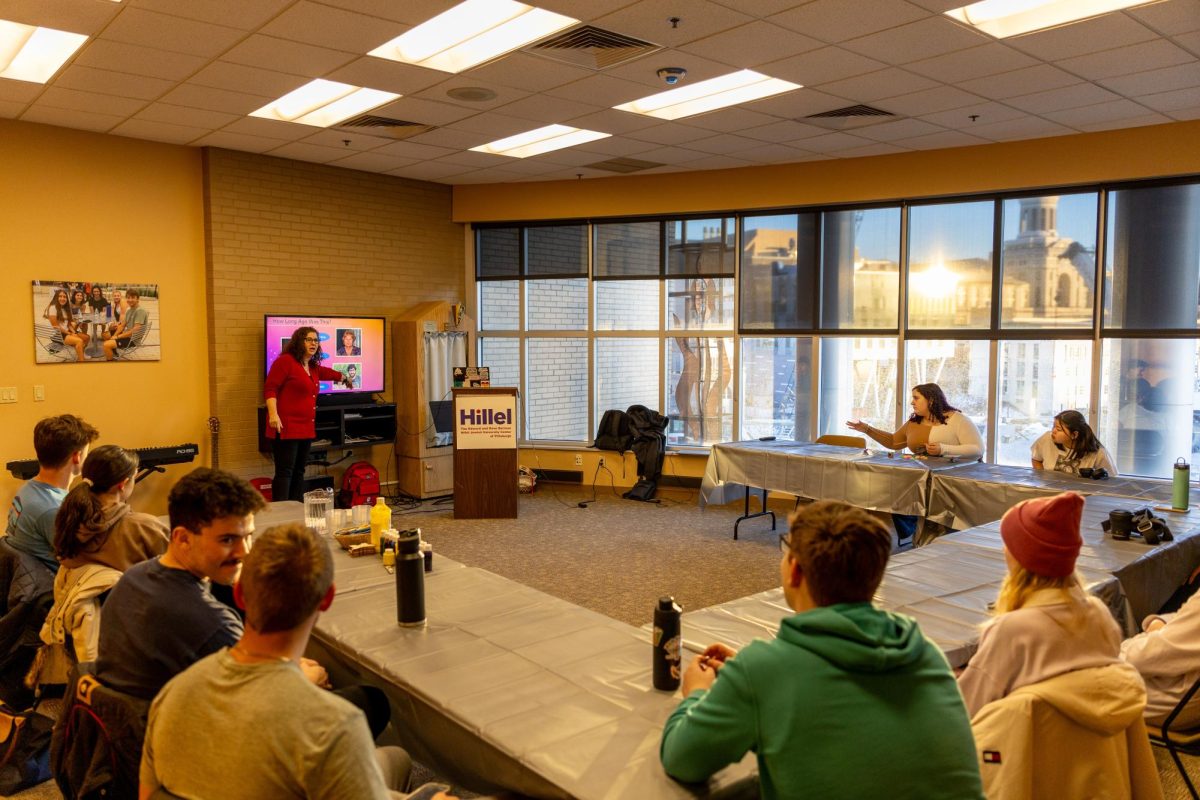As fewer and fewer survivors of the Holocaust remain alive, Pitt-Greensburg professor Dr. Melissa J. Marks believes it’s important to remember and learn from their histories.
“I think Holocaust Remembrance Day gives us a chance to honor those who can’t tell their stories, and make sure that we’re doing the right thing,” Marks said.
Marks told the story of her mother and grandmother — two Holocaust survivors — to a group of about 20 Pitt and Carnegie Mellon students Wednesday evening. Hillel Jewish University Center of Pittsburgh hosted the event in honor of Holocaust Remembrance Day.
Pitt’s Office of Equity, Diversity and Inclusion also hosted an event recognizing the day Monday afternoon that included speakers, prayer and a “self-guided walk throughout history” educating about the Holocaust and its impact. On the international level, world leaders and dozens of Holocaust survivors gathered at the site of Auschwitz-Birkenau to commemorate the 80th anniversary of its liberation.
“My mom just turned 84, so we’re not talking about ancient history,” Marks said. “We’re talking about a couple generations ago, which is kind of a wild thought that this was allowed to happen in that recent history.”
Marks’s grandmother Rivka was born in Czechoslovakia and lived in Belgium with her husband Wolfe when Germany invaded, and Marks’s mother Helen was born shortly after. In the spring of 1941, Marks said Nazis came to take her grandfather to work in Auschwitz, and later that year the Nazis returned to take the women and children, sending Rivka and Helen to a sorting camp.
“What they do is they look, and they say, ‘You look like you can work. We’re going to put you on the train here’ … ‘You guys don’t look you can work so well, we’re going to send you straight to to Treblinka. We’re going to send you straight to Auschwitz,’” Marks said. “All of the children, itty bitty babies, were thrown onto a cart. If they lived through the train ride, they were killed as soon as they got to Auschwitz.”
Rivka and Helen were able to escape by outwitting a Nazi officer and afterward spent time living in a furniture warehouse and later on the streets until they found a Catholic family who took Helen in, while Rivka was able to hide as a maid in another household.
“So the kindness of strangers — random kindness of strangers — ended up helping my mother and my grandmother survive,” Marks said.
Out of Rivka’s large family — including her 14 siblings, parents and nephews — Marks said only four survived.
“I should not exist,” Marks said. “My mother should have been part of the 1.5 million children killed in the Holocaust. There was no reason that she survived when somebody else didn’t, except for luck. One person made a difference.”
Emily Smulewitz, the Springboard Innovation fellow at Hillel JUC, came up with the idea for the event after spending time in Europe learning about antisemitism.
“I visited a number of different countries, and I learned about antisemitism in all these different places,” Smulewitz said. “I wanted to try to bring back some of that information into my role at Hillel and touch on that in Pittsburgh, so I decided to organize this event for International Holocaust Remembrance Day, and I brought in the help of my colleague.”
They reached out to the Holocaust Center of Pittsburgh to see if a Holocaust survivor would be able to speak at the event and connected with Marks instead.
“It’s always interesting to hear new perspectives of the Holocaust, like [from] survivors or family members, so that was a really nice opportunity that we were able to have,” Smulewitz said.
As part of the event, students painted butterflies, a project Smulewitz said was inspired by “The Butterfly,” a poem written by Pavel Friedmann and dedicated to children who were killed in the Holocaust.
Lily Friedman, an undecided first-year, attended the event because she thought it was important to learn about the Holocaust.
“It just sounded like something that not only am I interested in, but with everything that’s been going on, I feel like I want to be a bigger part of the community,” Friedman said.
While Friedman felt the story was sad to hear, she said it was overall an experience that felt good.
“It’s kind of crazy to hear a story in person that’s true, because you can read so many books and so many articles, but to actually hear a story from someone who has family that experienced that is really insane,” Friedman said. “And this story specifically was so powerful.”


